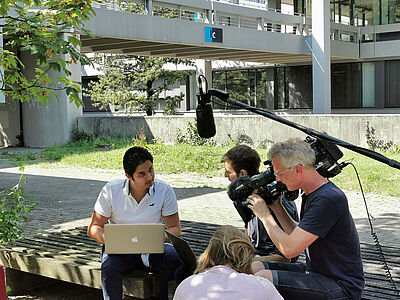Many politicians in Germany as well as political parties buy Likes in social media, especially in Facebook. HGI researchers have discovered this together with reporters from Süddeutsche Zeitung, NDR and WDR. It is not bots or faked accounts that are the source of the likes, but real users who mark certain content with "like" for money. In contrast to bot activities, it is difficult to detect whether the interactions of real people are fake-like or not. The media reported on the results on 18 and 19 December 2019.
Facebook mainly Affected
The team analyzed a crowdworking platform called "Paid Likes", on which you can buy Likes for posts, photos, videos, apps, profiles, groups or comments in different social networks. The crowdworkers likes the desired content, each click receives a few cents. For each click campaign, the online service creates its own website, the URL of which is systematically put together, as Bochum researcher Dennis Tatang and online activist Philip Kreißel have found out.
"Every campaign URL has a number as its unique ID," explains Dennis Tatang. "The campaigns are simply consecutively numbered. By starting at one and testing out all possible numbers in the URL, Tatang and Kreißel were able to identify the URLs of around 89,000 click campaigns that have been posted since 2012. An analysis showed that 86 percent of them ran on Facebook. 5.6% were on Youtube, the rest on other social networks, including a German dating platform.
All parties involved
The click campaigns covered a wide variety of topics - including personalities, groups and products. Among other things, researchers and the media found that Facebook Page Likes were bought by many local groups of political parties. This applies to all parties currently represented in the German Bundestag, even if with varying frequency.
"But the campaign pages don't tell us who sponsored the campaigns," explains Tatang. "So it's possible that the institution or person who runs a Facebook page didn't buy the likes for it themselves.
PhD student Dennis Tatang is currently working on the results as a scientific publication, together with Florian Quinkert, Martin Degeling and Prof. Dr. Thorsten Holz, head of the Chair for System Security, as well as Michael Sehring, formerly employed as a scientific assistant at the HGI.
Get more information here from NDR or here from Funk.
Press contact
Julia Laska und Christina Scholten
Marketing und PR
Horst Görtz Institute for IT Security
E-Mail: hgi-presse(at)rub.de
General note: In case of using gender-assigning attributes we include all those who consider themselves in this gender regardless of their own biological sex.


